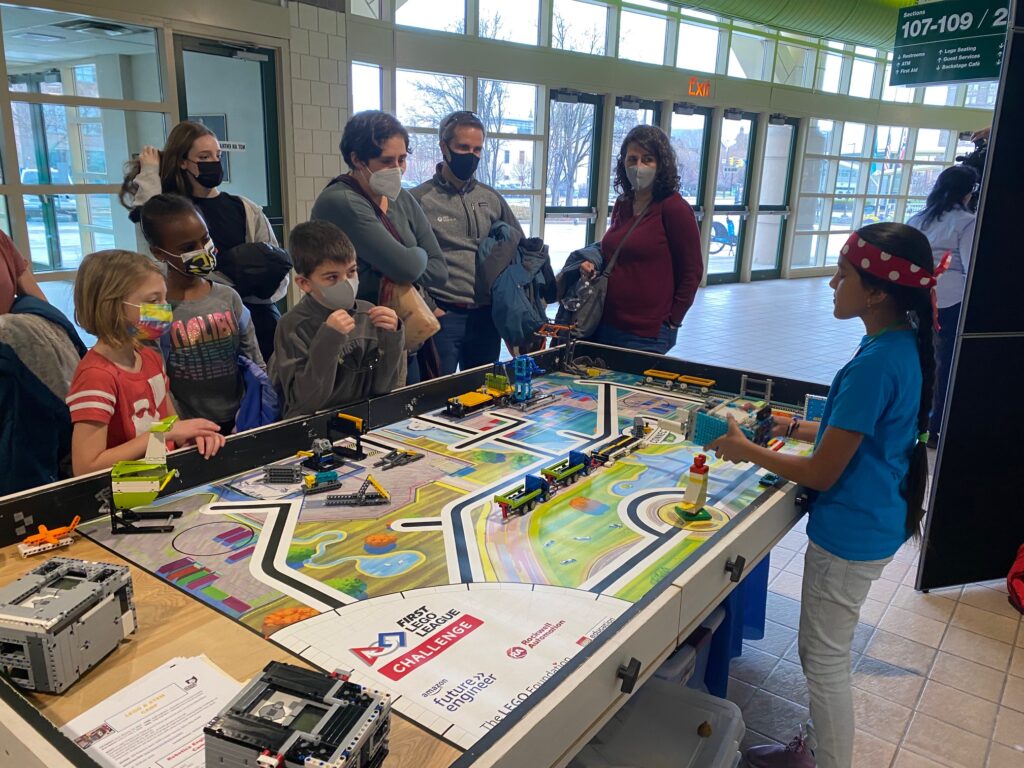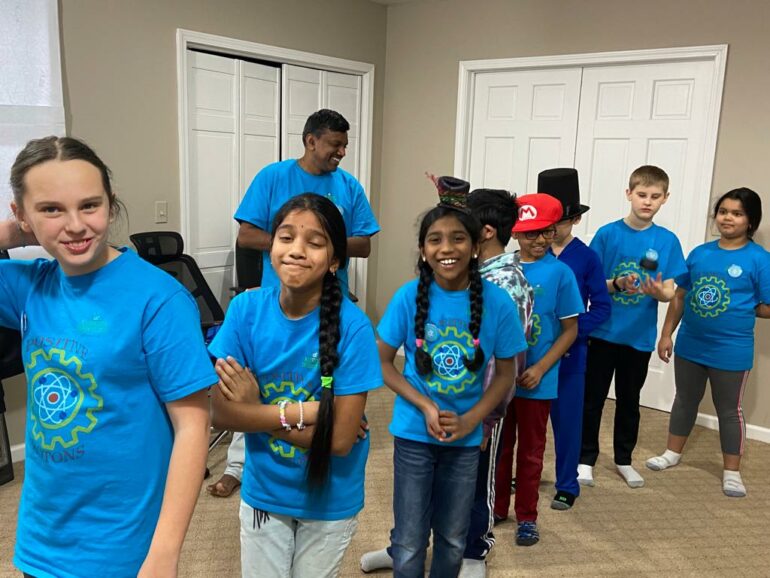They know the basics of Python and Javascript. They can automate a SPIKE Prime robot with omnidirectional wheels. They have a fundamental understanding of shipping-receiving mechanics at an Amazon warehouse.
Oh, and they’re in elementary school.
This April, seven students from Leighton Elementary in Aurora will be heading to the FIRST Lego League World Championship in Houston after clinching the state qualifying win from 39 teams across Ohio in March. In third to fifth grade, the robotics-inclined Positive Protons — Aadhav Sathyamurthy, Diya Kumar, Diya Shah, Josh Bowen, Paul Berendt, Sarah Bown and Tevona Sesuraj — have only one minor obstacle before showing up to Houston’s George R. Brown Convention Center: They need to fundraise the $12,000 travel expenses to get them there.
In line with the philosophy of LEGO’s FIRST — For Inspiration and Recognition of Science and Technology — the World Championship is a massive annual event, used to promote STEM talents under the guise of toy brick robotics. (The gathering for 2019 in Detroit and Houston drew 300,000 students from 106 countries.) It’s a momentous event, especially when STEM education in primary schools has been rocketing in the past decade.
This year, the largest since pre-Covid, is no different. Except that the Positive Protons have a chance of winning the top spot.
Along with winning both the regional and district qualifiers, the team beat 450 other Ohio teams in the FLL Ohio State Championship in August. Under the 2022 theme of “Cargo Connect,” the seven students spent October, about 25 hours a week, weeding through ideas of how to better the U.S. supply chain. One group looked at medical supply delivery in Alaska (repurposing skis): optimizing package sizes, aerogels. Another toured Vita-Mix, in Olmsted Falls, to observe how biodegradable foam could be used for eco-friendly packaging. (There wasn’t a cost-effective solution.)

Come the middle of October, after entertaining the insight from area shipping and receivers, even fieldtripping to UPS warehouses in Cleveland, they chose to tackle a problem of safety and efficiency common in the age of Amazon: how to speed up a container truck’s unloading process, to save both the warehouse time and increase the driver’s uptime.
“If you see Amazon drivers, the conveyor belt is next to the truck,” said Senthil Ragupathi, parent of Diya and co-coach of the Positive Protons.
“Once the kids saw a video of this process, they thought, ‘Why are we not having that in the truck? Then the truck drivers don’t have to wait three hours for a forklift.’”
The real-world solution, scaled down with the help of a LEGO Technic Kit and a SPIKE Prime robot kit, was for truckers to “retrofit” steel rollers, a motor and a stainless steel belt onto the bed of an 18-wheeler’s haul load. This, the Protons calculated from a binder 200 pages thick, saves 80 percent of unloading time. No forklifts needed, or pallets. Only two workers would be required — compared with the typical five.
Ragupathi, a senior manager for Vita-Mix with 24 years of IT experience, says that both he and coach Mike Berendt, a mechanical engineer and father of Paul, a fourth grader, were more hands off than on.
“We are really there to guide them,” Ragupathi said. “We really don’t do any of the work. All the research of the project is done by the kids.”
“We’re here to bridge the grown-up world with the one third, fourth and fifth graders are used to,” Berendt said. He laughed. “We’ve had trouble keeping the kids engaged some of the time. But it’s helped me.”
Sathyamurthy Swaminathan, parent of Aadhav and a systems analyst for STERIS in Mentor, says that although the coaches are not there to spearhead project design, they are more like bumpers around the gutters. Especially with questions around Scratch, a kid-friendly, drag-and-drop programming language used to automate a robot’s functions.
“The coaches will help a little bit,” Swaminathan said. “OK, can you reduce the speed? Can you increase the payload? Can you make the robot more stable?’”
“It’s those kind of generic things the coaches will give and the kids themselves, they’ll discuss: ‘OK, what would be the speed if I have to…?’ That kind of thing.”
At Leighton Elementary, a suburban school with an attendance of 670, Michael Roberto, the district superintendent, paints the Protons as both an anomaly and a clear result of Leighton’s STEM chops. (Leighton’s math proficiency is 22% above the state average.)
While the Protons, or their cargo project, are not bankrolled by Leighton, Roberto still likes to think their “Cargo Connect” LEGO conveyor was a byproduct of Chromebook-powered robot coding. (Dash Robots, a primer for robotics, debuts in Leighton’s third grade classrooms.) After all, Leighton has sent two robotics teams to out-of-state robotics teams in the past five years — one in Tennessee, another in California.

“We nurture competition,” Roberto said. “It’s being innovative, trying to think differently. Collaborating. Just being good critical thinkers. With robotics competitions, they’ve hopefully taken the things we’ve helped them with, and improved it on their own.”
In Houston, where the Protons will endure what Ragupathi labels a “coopertition,” they will be judged on their robot’s design, efficiency, timeliness and innovation in a two-and-a-half-minute test to “finish missions” on a “game board.” Not just tossing Legos around, they will also have to impress judges with a poster board presentation, parsing down those 200 binder pages of research.
But before the conveyors spin, Ragupathi says, they need to raise $12,000, the estimated cost of flying the seven kids and their coaches to Houston for three days starting April 20. (They’ve raised roughly $8,000 as of this writing, $3,000 from GoFundMe.) Sponsorships so far have come from the Ohio Education Association, Aurora Robotics, FLL Ohio and Aurora One Funds, but Ragupathi said he and Berendt will have to finance the trip themselves if no one steps up to bat.
The Protons are already eyeing 2023’s big invention. “Some of the kids, they are already exploring that they want to do something different next year,” he said.
If they win?
“I’d be over the moon, absolutely,” Berendt said. “I don’t think there are a lot of teams that are fourth and fifth graders that make it to World’s. Maybe next year will be better.”
Mark Oprea is a freelance journalist based in Cleveland.

